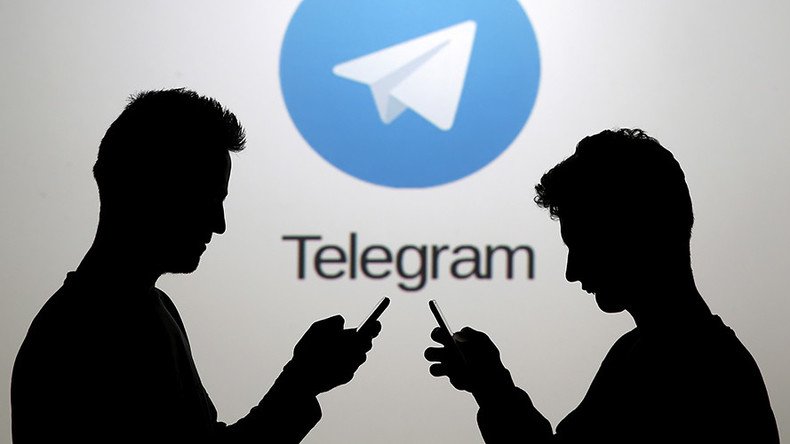It’s not often that Russia’s most fervent media detractors find themselves on the same page as the Kremlin. But when it comes to the dangers of internet anonymity, Moscow is making moves that some of its sternest critics want implemented in the West.
Russian media watchdog Roskomnadzor’s target is Telegram, a popular messaging app, which is also known in the English-speaking world as ISIS’ communications platform of choice.
The service was founded by Pavel Durov, a St. Petersburg native, who first rose to prominence as the creator of VKontakte (In Contact), a Facebook rip-off popular across the former Soviet Union.
Moscow officials contend that terrorists and criminals are exploiting the application to direct their operations, and as a result, they want Telegram to share its users’ chats and their cryptokeys with law enforcement agencies, if and when requested. Should the IT firm fail to accept those terms, the service will be blocked in Russia. The Zello and Blackberry messenger services have already been cut off for non-compliance.
Durov insists he would never share this kind of data with anyone, meaning the proposed ban seems inevitable. He further counters that any prohibition would be pointless as it will just inspire nefarious actors to use American-competitors like Viber and WhatsApp.
Educated Views
But lawmakers argue that Telegram’s client base and structure means it’s a bigger threat to safety than either Viber or WhatsApp. A view supported by Professor Peter Neumann, an expert on terrorism at King’s College London, who told the Financial Times earlier this month, “Big social media platforms have cracked down on jihadist accounts, with the result that most jihadis are now using end-to-end encrypted messenger platforms such as Telegram. This has not solved the problem, just made it different.”
Neumann’s contention is echoed by Rob Wainwright, the head of Europol, who claims, “there are some that simply won’t co-operate with us. One in particular causing major problems for us is Telegram.”
And the Middle East Media Research Institute warned how Telegram has become a "fertile and secure arena" for ISIS and there "appears to be no way in to monitor it.”
The current furor started in May when Roskomnadzor first told Telegram it must register as an “information distributor.” Shortly afterward, the Russian parliament drafted legislation seeking to ban anonymity on instant messenger apps – requiring users to register accounts using their real names, verified with their phone numbers.
This mirrors a recent Times of London column by Edward Lucas who insists“online anonymity has enabled extremists to spread propaganda and raise money with impunity for far too long.” Lucas, a senior editor with The Economist, described the web as a “paradise for malefactors,” and called for pressure on tech titans to offer us “the ability to prove who we are, and to check the identity of the people we are dealing with.”
Lucas’ opinion is shared by Washington Post columnist Anne Applebaum, who has written that “human rights, including the right to freedom of expression, should belong to real human beings, and not to anonymous trolls” in her call to put a stop to online anonymity.
The Next Stage
Nevertheless, Russia's move has its detractors, with Bloomberg’s Leonid Bershidsky citing how “censoring the internet is as difficult as it is futile,” Moscow opposition journalist Oleg Kashin saying that ”Telegram really has become an important political platform.”
However, closing down online portals considered a threat to security is by no means an exclusively Russian phenomenon. For instance, Britain’s ruling Conservative Party is preparing to “introduce huge restrictions on what people can post, share and publish online,” according to Buzzfeed News. This fits with some ominous phrasing in their recent election manifesto, which states, "Some people say that it is not for government to regulate when it comes to technology and the internet; we disagree.”
It also follows comments from the Home Secretary, Amber Rudd, who wants police and spy agencies to be granted access to WhatsApp and other encrypted messaging services.
Meanwhile, from 2010 to 2015, 2,130 people were arrested in the United Kingdom for allegedly posting ‘offensive’ messages on social media.
Across Europe, leaders are also calling for more restrictions on web discourse. Only last week, European Council President Donald Tusk said Brussels was ready to adopt relevant legislation “to prevent the spread of terrorist material on the internet.” Tusk was supported by new French President Emmanuel Macron, who has been a vocal critic of tech firms’ tolerance of extremist content.
Perhaps that’s why many of the usual suspects have been relatively slow to criticize Russia for its possible clampdown on Telegram. Because, in their heart of hearts, they realize Moscow is justified in taking steps against a platform which might make things a little too easy for the bad guys.
The statements, views and opinions expressed in this column are solely those of the author and do not necessarily represent those of RT.



